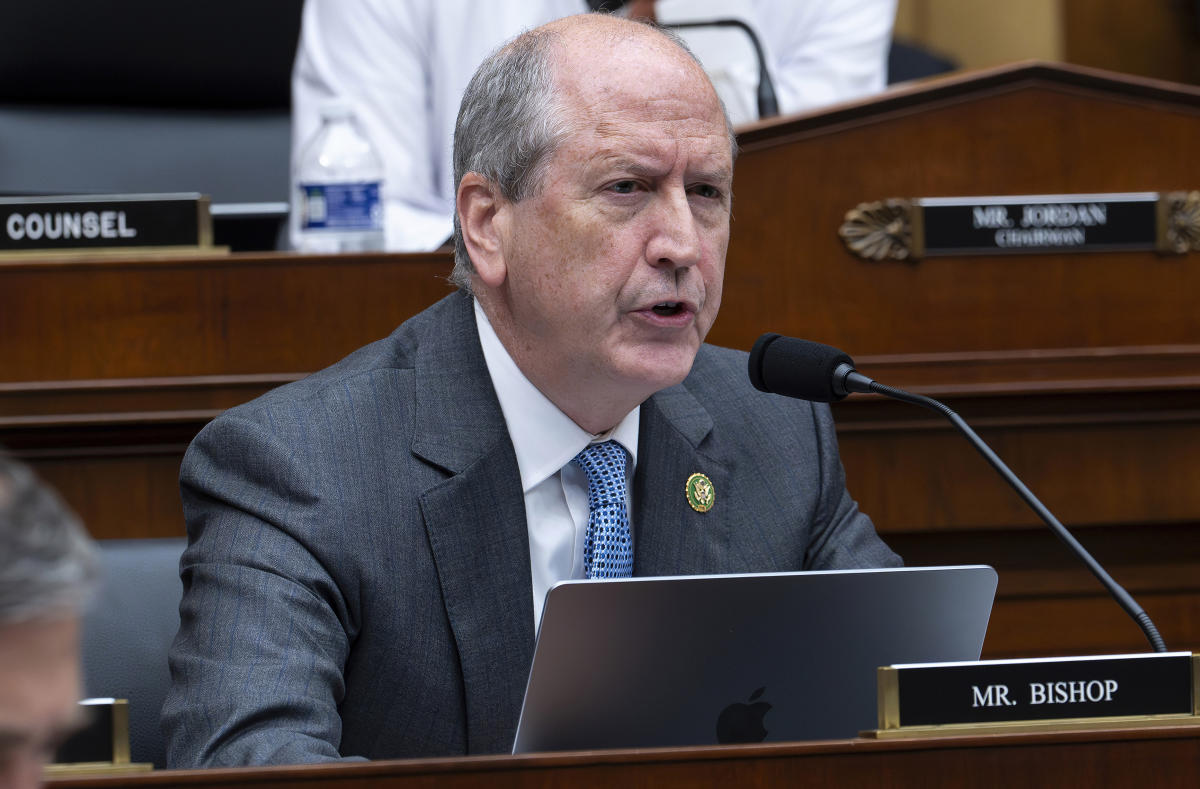Instead of trying to keep their seats in Congress, two North Carolina politicians are vying for a high-profile office closer to home: state attorney general.
The career path that Republican U.S. Rep. Dan Bishop and Democratic U.S. Rep. Jeff Jackson are trying to follow was once a rarity but has become more common across the country as the attorney general position has become more prominent — and taken a more partisan tone.
The North Carolina race is among the most closely watched of the 10 attorney general elections across the U.S. this November. Bishop is the only Republican running in the swing state, but Jackson faces two other Democrats in the March 5 primary.
Differences between the candidates are stark. The attorney general has, among other things, a role in how to enforce state laws and whether to defend them when they’re challenged in court. And the North Carolina candidates couldn’t be more different in their approaches.
Jackson said he could, for example, follow the path taken by the Democratic incumbent and refuse to support a law adopted last year that bans most abortions after the first 12 weeks of pregnancy. “I see the job as standing up for people in defense of their fundamental rights,” Jackson said in an interview. “I’m prepared to stand up to the state legislature.”
Bishop, on the other hand, said he would defend the law and others — even if he disagreed with them — unless “it is unconstitutional beyond any reasonable argument.”
Their state is one of six where the incumbent won’t be on the ballot, including Oregon, Pennsylvania, Utah, Washington and West Virginia. Incumbents are expected to try to keep their jobs in Indiana, Missouri, Montana and Vermont.
Most of the states with elections are dominated by one party, but purple Pennsylvania has a crowded April primary ballot for both Republicans and Democrats.
___
The attorney general job has been a springboard to higher office for so long that there’s a joke that “AG” stands for “aspiring governor.” Current North Carolina Attorney General Josh Stein is running for governor, as are the top government lawyers in Washington and West Virginia. Former President Bill Clinton and current Vice President Kamala Harris have attorney general on their resumes, alongside a long list of governors and senators.
But over the past decade, a pipeline from Congress to attorney general has developed. Five sitting attorneys general — Maryland’s Anthony Brown, Minnesota’s Keith Ellison, Arkansas’ Tim Griffin, Idaho’s Raul Labrador and Indiana’s Todd Rokita — were all previously in Congress.
It’s a big change.
“You don’t have to go find 218 people to get a vote,” Ellison, a Democrat who was previously a six-term member of Congress, state lawmaker and director of a public interest law firm, said in an interview. “You say, ‘Here’s what we’re going to do, team.’”
Ellison said that his time in Congress helped him get to know the federal agencies he often interacts with now, but that his time as a trial lawyer was also important in preparing him for his current job.
___
Duties vary by state but generally include roles as criminal prosecutor — representing the state in court and protecting consumers, with the latter often carried out through multi-state lawsuits against companies.
Attorneys general have in recent years been on the front line of lawsuits and settlements against drugmakers and others over the toll of prescription opioid painkillers; and most of them joined together last year to sue Facebook parent company Meta, claiming that features on its social media platforms are addictive.
It’s become more common over the past two decades, however, for attorneys general to join with colleagues only from their party to challenge federal government policy — mostly those put in place by presidents from the opposite party.
Bishop, a member of the conservative Freedom Caucus who joined Congress after winning a special election in 2019, said that with an often gridlocked Congress, presidents are using regulations to create policy — and overstepping their bounds.
“It’s often falling to AGs to protect fundamental rights and to stop regulatory overreach,” he said.
Bishop said he supports the effort by the Republican attorneys general of Missouri and Louisiana to bar the FBI and other government agencies from contacting social media platforms such as Facebook and X, formerly Twitter, to urge that content be removed. The U.S. Supreme Court is scheduled to hear arguments on the case on March 18.
There have also been partisan broadsides against businesses. Last year, 13 GOP attorneys general warned CEOs of the 100 biggest U.S. companies that there could be legal consequences for using race as a factor in hiring and employment practices. But that hasn’t led to litigation so far.
Meanwhile, during Donald Trump’s presidency, Democrats repeatedly sued over policies such as a ban on travel to the U.S. from several mostly Muslim countries and allowing more employers to opt out of providing birth control coverage by claiming religious or moral objections. Democratic attorneys general also defended former President Barack Obama’s health insurance overhaul in court when Trump’s administration wouldn’t.
___
Jackson, a TikTok-savvy politician in his first term in Congress, decided to enter the race after redrawn congressional maps removed him from the district west of Charlotte he’s representing.
It would have taken him years to build up seniority to have significant power in the House. But the job he’s seeking now is different, he said: “You reach your full influence upon being elected to attorney general,” he said.
Also on the primary ballot are Democrats Satana Deberry, a progressive district attorney, and Tim Dunn, a private-practice lawyer. Jackson has a major fundraising lead and the support of the Democrats in North Carolina’s congressional delegation.
James Tierney, a former attorney general in Maine, one of the seven states where attorneys general are appointed rather than elected, teaches about the office at Harvard Law School. He said people with the job need to be careful not to take only partisan action because it can weaken the office’s clout.
“If an AG acts like a congressman, they’re going to get treated like a congressman,” he said, “and they won’t get the deference from judges and the bar that an attorney general deserves.”

Amanda Smith is a dedicated U.S. correspondent with a passion for uncovering the stories that shape the nation. With a background in political science, she provides in-depth analysis and insightful commentary on domestic affairs, ensuring readers are well-informed about the latest developments across the United States.






